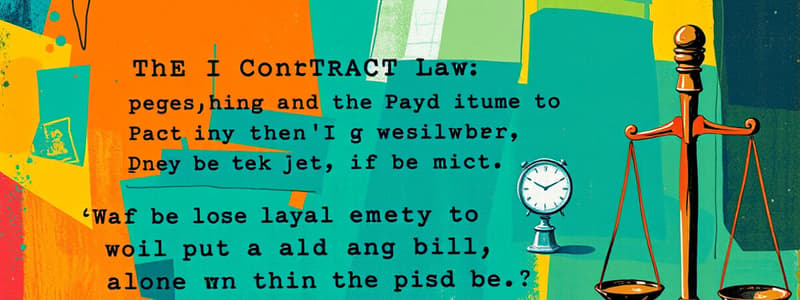Podcast
Questions and Answers
What was the key issue in the case of Handbury v Nolan?
What was the key issue in the case of Handbury v Nolan?
- Was the auctioneer's statement a promise? (correct)
- Was the cow sold legally without a warranty?
- Was the auctioneer's statement a representation of fact?
- Did the buyer have legal standing to sue?
What did the court imply from the auctioneer's statement?
What did the court imply from the auctioneer's statement?
- The statement did not have any legal implications.
- The statement was a casual remark.
- The statement constituted an express term of the contract. (correct)
- The statement was purely an opinion.
What factor contributed to the court's decision in Handbury v Nolan?
What factor contributed to the court's decision in Handbury v Nolan?
- The auctioneer's lack of knowledge regarding the cow
- The language of the statement expressed as a representation (correct)
- The auctioneer's absence during the sale
- The buyer's prior experience with cows
What was a significant circumstance considered by the court in Handbury v Nolan?
What was a significant circumstance considered by the court in Handbury v Nolan?
Which aspect of the auctioneer's statement was crucial in determining its nature as promissory?
Which aspect of the auctioneer's statement was crucial in determining its nature as promissory?
What characterizes a puff statement?
What characterizes a puff statement?
What is a representation in the context of contract negotiations?
What is a representation in the context of contract negotiations?
Which of the following scenarios would likely be considered a misrepresentation?
Which of the following scenarios would likely be considered a misrepresentation?
In the case of Oscar Chess Ltd v Williams, what was determined about W’s statement regarding the car's age?
In the case of Oscar Chess Ltd v Williams, what was determined about W’s statement regarding the car's age?
What factors determine whether a statement is considered promissory?
What factors determine whether a statement is considered promissory?
What happens if a representation is proven to be false?
What happens if a representation is proven to be false?
Which statement is true about opinions in the context of contract negotiations?
Which statement is true about opinions in the context of contract negotiations?
What is the consequence of a misrepresentation in a contract negotiation?
What is the consequence of a misrepresentation in a contract negotiation?
What must parties intend for a statement made during negotiations to be enforceable as a contractual promise?
What must parties intend for a statement made during negotiations to be enforceable as a contractual promise?
In which type of contract are promises made during negotiations not enforceable?
In which type of contract are promises made during negotiations not enforceable?
What is a required characteristic of a statement made during negotiations for it to be enforceable?
What is a required characteristic of a statement made during negotiations for it to be enforceable?
In the case of Van den Esschert v Chappell, what was the outcome regarding the oral promise?
In the case of Van den Esschert v Chappell, what was the outcome regarding the oral promise?
Which of the following statements best describes 'puffery' in the context of negotiations?
Which of the following statements best describes 'puffery' in the context of negotiations?
What results from a contract being classified as wholly-written?
What results from a contract being classified as wholly-written?
What distinguishes a partly-written, partly-oral contract from a wholly-written contract?
What distinguishes a partly-written, partly-oral contract from a wholly-written contract?
Which type of statement cannot become a contractual term during negotiations?
Which type of statement cannot become a contractual term during negotiations?
Flashcards are hidden until you start studying
Study Notes
Terms of a Contract
-
Express Terms: Statements made during negotiations that can be enforced as contractual promises if parties intended to enter into a partly-written, partly-oral, or wholly oral contract.
-
Types of Contracts:
- Wholly-written contracts: Involve signed documents intended as the only source of obligations.
- Partly-written, partly-oral contracts: Include signed documents along with additional orally agreed terms.
- Oral contracts: Contain terms solely agreed upon verbally with no written documentation.
Promissory Statements
-
For promises made during negotiations to be enforceable, they must be sufficiently promissory and related to the intended contract type.
-
Puffery: Exaggerated claims meant to engage interest; recognized as non-promissory and not part of the contract.
-
Opinions: Personal views or beliefs that do not create legal liability; also not included in the contractual terms.
-
Representations: Statements of fact made during negotiations that do not equate to contract terms and can lead to misrepresentation if proved untrue.
Legal Cases
-
Van den Esschert v Chappell:
- Oral promise regarding house infestation led to a finding that it was a partly-written, partly-oral contract obligation.
-
Oscar Chess Ltd v Williams:
- Misrepresentation case involving incorrect identification of a car's model; seller lacked expertise, hence no promise was inferred.
-
Handbury v Nolan:
- An auctioneer's statement about a cow's pregnancy was deemed promissory as it was made confidently and in a knowledgeable context, thus forming contractual obligation.
Key Determinants of Promissory Nature
- The determination of whether a statement is promissory depends on the language used and the context in which it was made.
- Promissory statements must be clearly distinguishable from opinions, puffery, or mere representations to establish contractual liability.
Studying That Suits You
Use AI to generate personalized quizzes and flashcards to suit your learning preferences.




